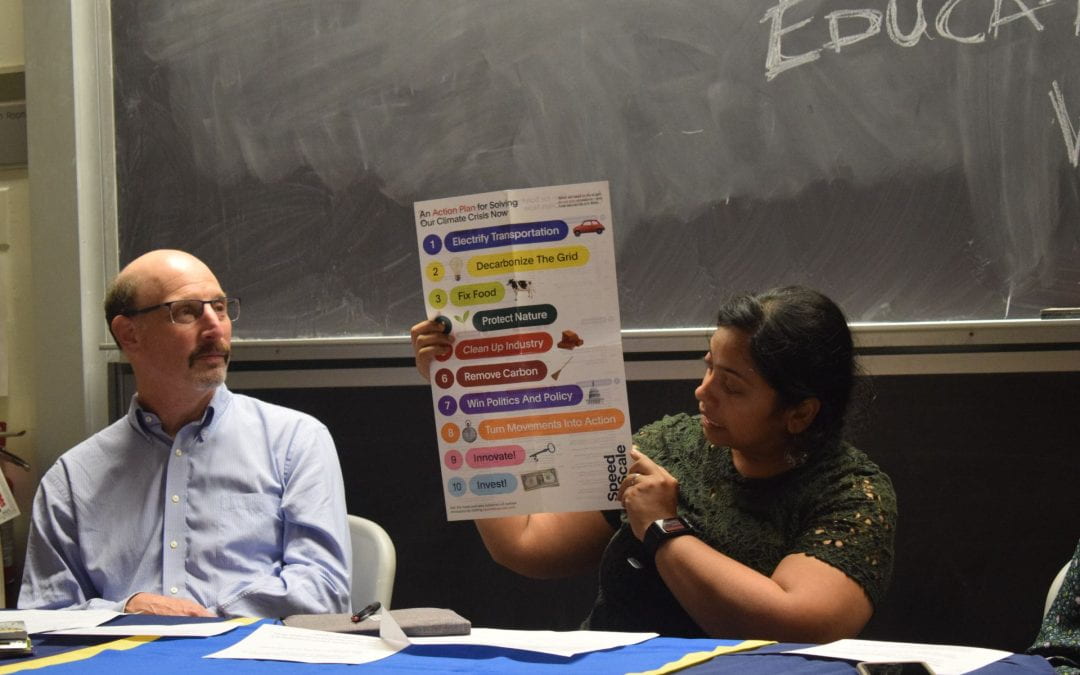On October 6th, from 6 to 8 pm in Kirkbride Hall, the Climate Change Hub held a Climate Education Workshop. The workshop featured numerous panelists, including natural sciences and engineering faculty, social sciences and humanities faculty and undergraduate/graduate students. The faculty panelists in this workshop were provided grants by the Hub this summer to modify their course curriculum to increase climate focus, implement new course modules or start brand new courses related to climate and climate change.
The speakers that presented in the social sciences and humanities panel were Jennifer Trivedi, Georgina Ramsay, Kelly Cobb and Hub co-director A.R. Siders.
Dr. A.R. Siders discussed her work with climate fiction and video games and how they are being used to increase interest in climate change and get people thinking about bigger ethical questions. She argued that climate change is more of a mindset than a skill set.
Dr. Jennifer Trivedi talked about scaling down climate change to get students to understand the spatial and temporal elements of climate, including what climate change means in their lives. In her modified class, BHAN304: Health, Culture and the Environment, Jennifer Trivedi has students make climate change timelines and make posters on climate change in their lives which they present to each other in rapid style. Her class focuses on zombie apocalypses and zombie ethics as a way to engage students while also educating them on real issues.
Professor Kelly Cobb discussed her research on sustainable textiles and her seminar on fashion and sustainability: FASH210. Professor Cobb’s course focuses on fashion expression, aesthetics and community building, with the goal of the course being to decouple wearing clothing from buying clothing and breaking systemic behavioral processes. The course includes discussion forums, company research and wardrobe/label case studies.
Dr. Georgina Ramsay is a researcher of displacement who teaches a course on climate refugees and environmental displacement. She is now including climate refugees in her course as she believes that the definition of a refugee, written in 1951, is outdated and exclusive. Dr. Ramsay argues that the most visceral forms of displacement occur when someone is stuck in a place. She encourages her students to think about places in their own lives using sensory mapping in visualizing their place 20 to 30 years after climate change’s impacts. Her course focuses on the intersection of vulnerabilities of minority groups including migrants, women, people of color and traditionally peripheralized people.
The faculty in this panel hope to make climate discussions more fun, teach students to be comfortable with uncertainty and think about the world a little differently.
The speakers that presented in the natural sciences and engineering panel were Haritha Malladi, Michael Chajes and Hub co-director Dana Veron.
Dr. Michael Chajes specializes in civil engineering and is the dean of the Honors College. His work involves looking at mitigation aspects of climate change. His class, CIEG402: Introduction to Sustainability Principles in Civil Engineering, focuses on sustainability and its connection to climate change. Dr. Chajes teaches about impacts and solutions and has students in his class write personal narratives. The students also take on news segments and present on energy and sustainability innovations.
Dr. Haritha Malladi teaches EGGG101: Introduction to Engineering. While this course primarily focuses on engineering concepts, Dr. Malladi wanted to incorporate a climate change module into the course. Students are currently working on a prototyping project and while waiting for prototypes, Dr. Malladi is teaching her climate change module. For this module, she is showing climate change news to the class and talking about climate change in various disciplines. In EGGG101, Dr. Malladi hopes to challenge assumptions about climate change knowledge and establish interdisciplinary connections to climate change.
Dr. Dana Veron teaches GEOG/MAST341: Climate and Climate Change. In her class, students start out reading a fiction book about a disaster scenario. This initiates discussions about individual disasters and encourages an understanding of how the climate system works. Students write climate fiction stories in order to think more critically about their interests. Dr. Veron also uses a carbon cycle game to distinguish between a pre-industrial and post-industrial system and create a felt and visual impact of carbon emissions.
The faculty in this panel hope to see environmental and climate change requirements at the university as well as graduate climate certificates.
The undergraduate panel provided a unique perspective on climate change education. Graduate students, especially those in engineering, seem to be struggling to fit climate change electives into their schedules. Having climate courses is a huge step but it seems that the next step will be increasing their accessibility to graduate students and/or engineering majors. Graduate student Bradie Crandall hopes to see courses include more applied climate models. Graduate student Faisal Bin Islam echoed the argument about inaccessible graduate-level climate courses. Faisal also advocated for the UN’s sustainable development goals to be implemented as loose frameworks for courses at the university.
At the end of the panel, participants pondered the possibility of linking art activism and dance theories to climate change. Participants hope to see an evaluation of what the university faculty as a whole know about climate change. Panelists hope that students will learn both what climate change is but also what it is not. The university has come a long way in developing climate change curricula and with sustained passion and dedication, it will continue to flourish in the future.


